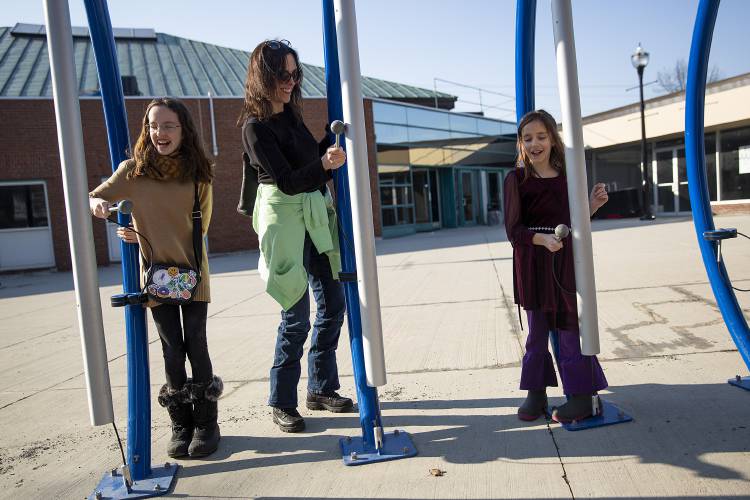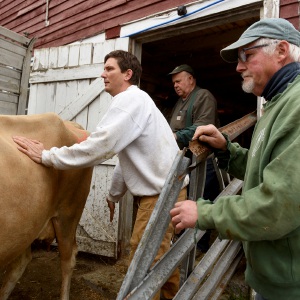This winter was the warmest on record for New Hampshire

Chelly Shaw, center, of Chepachet, R.I., plays hot cross buns on giant chimes with her nieces Alyson, 11, left, and Anna, 8, both of New London, N.H., at the Harmony Park musical playground at the Lebanon Mall in Lebanon, N.H., on Tuesday, Feb. 27, 2024. Shaw is in town for an upcoming family ski trip and spent the day outdoors with the girls taking advantage of the warm weather. (Valley News / Report For America - Alex Driehaus) Copyright Valley News. May not be reprinted or used online without permission. Send requests to permission@vnews.com. Alex Driehaus
|
Published: 03-15-2024 9:13 AM
Modified: 03-19-2024 4:44 PM |
New Hampshire had its warmest winter on record, according to data from the National Oceanic and Atmospheric Administration.
The average temperature for meteorological winter — December through February — was 28 degrees. That’s almost 9 degrees warmer than an average winter between 1896 and 2000.
Melting ice and slushy snow interfered with longstanding winter traditions and created tough conditions for skiers. Warm temperatures brought rain that fell on top of snow, causing major flooding in the North Country.
At the National Weather Service’s climate site in Concord, the temperature never dropped below zero degrees. There’s only been two other winters when that agency didn’t record any sub-zero temperatures at the site since recordkeeping began in 1868.
The lowest temperature on the coldest night of the year has increased between 6 and 14 degrees across the state in the last 50 years, according to the state’s latest climate assessment.
This winter was marked by a strong El Niño, a recurring climate phenomenon characterized by warm temperatures in the Pacific Ocean that can bring better chances for warmer temperatures in the northern United States.
But as humans continue to burn fossil fuels and heat up the atmosphere, winters in New Hampshire are also getting warmer over time.
State climatologist Mary Stampone said this winter is part of that pattern.
Article continues after...
Yesterday's Most Read Articles
 Herd departs Hartford’s last remaining dairy farm
Herd departs Hartford’s last remaining dairy farm
 At Dartmouth, hundreds protest ongoing war in Gaza and express support for academic freedom
At Dartmouth, hundreds protest ongoing war in Gaza and express support for academic freedom
 Claremont removes former police officer accused of threats from city committees
Claremont removes former police officer accused of threats from city committees
 Over Easy: ‘A breakfast without a newspaper is a horse without a saddle’
Over Easy: ‘A breakfast without a newspaper is a horse without a saddle’
“When you look back at the long-term records, the average winter temperatures are steadily increasing,” she said. “Mild winters like this are on the high end because of the added influence of El Niño. But this is still much higher than what El Niño winters did in the ’70s and the ’80s.”
But, Stampone said, there’s still time to mitigate climate change enough to keep winters like this one as some of the warmest, instead of the new normal.
“This doesn’t have to be every winter,” she said. “It can be our ‘warm’ winter, if we mitigate.”
Winter is the fastest-warming season in New Hampshire and most other places in the United States. This winter was the warmest on record for the United States as a whole, and seven other states also had their warmest winters, according to NOAA.
Minimum winter temperatures in New Hampshire are expected to warm more than seven degrees by the middle of the century in a scenario with a higher concentration of greenhouse gasses in the atmosphere. But if people cut climate-warming emissions, winters are expected to warm less. In a lower-emissions scenario, minimum temperatures could warm about five and a half degrees, according to the 2021 state climate assessment.
These articles are being shared by partners in The Granite State News Collaborative. For more information visit collaborativenh.org.

 JAG Productions announces closure, citing ‘crisis facing the arts’
JAG Productions announces closure, citing ‘crisis facing the arts’
